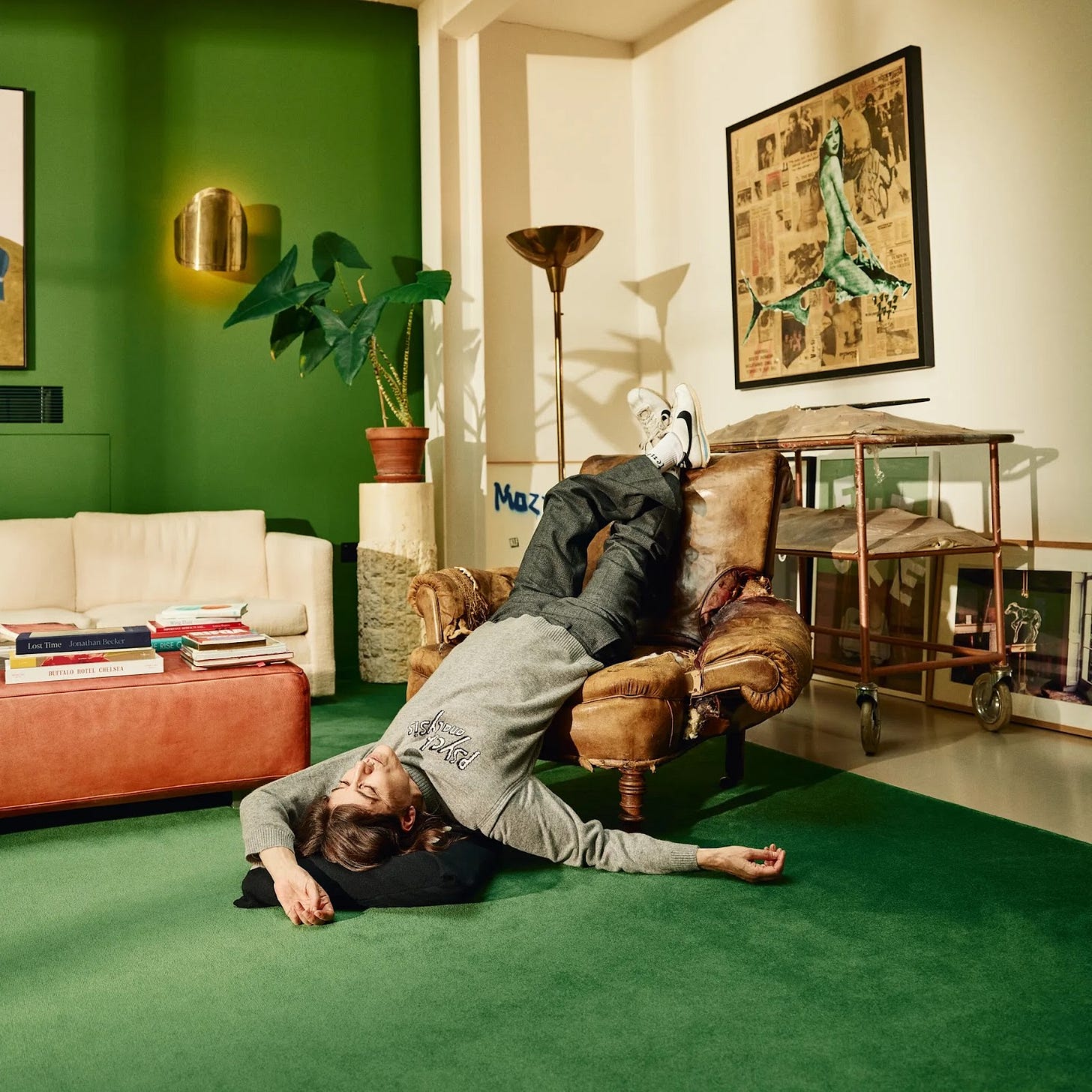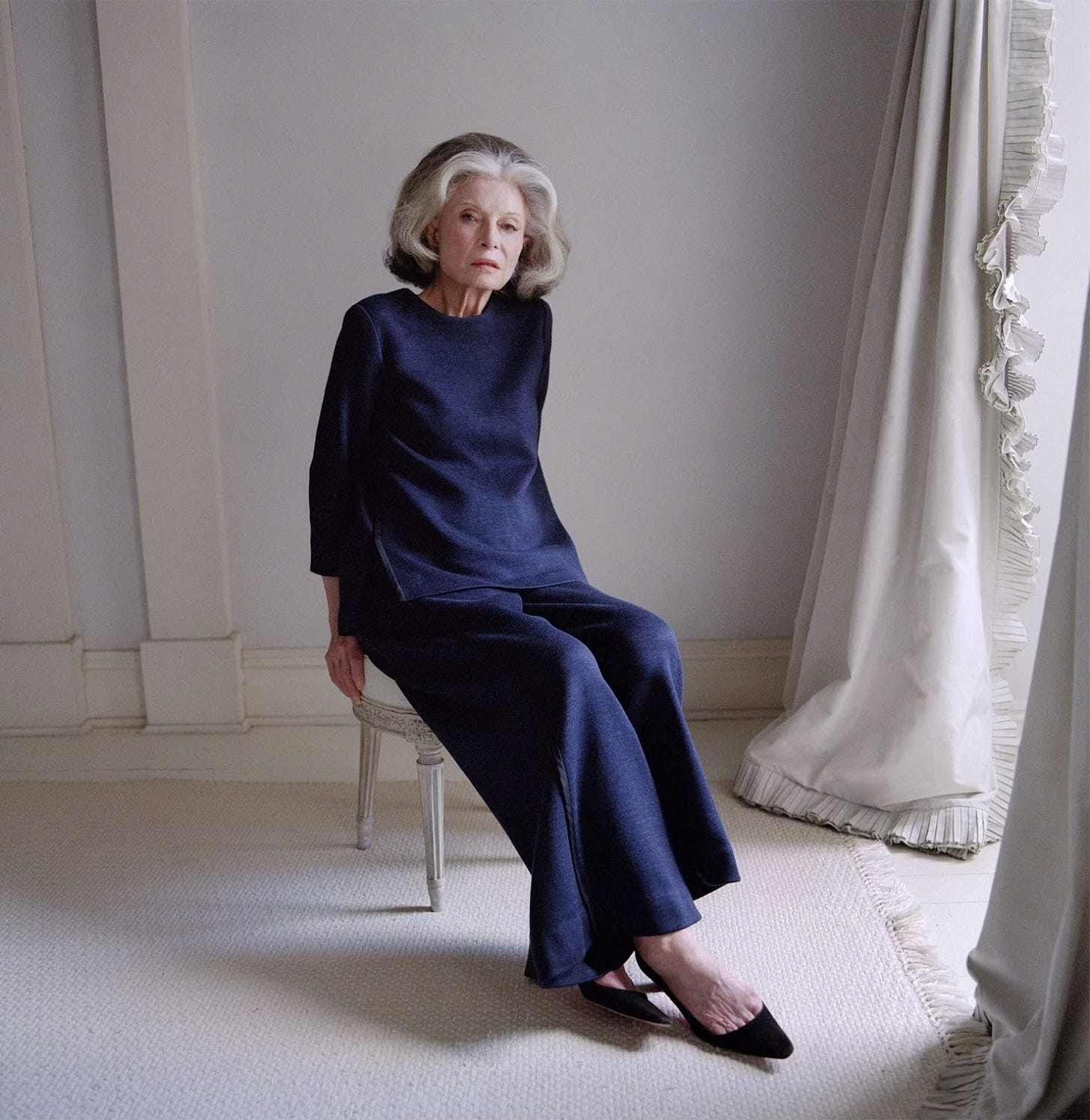Cool Your Slice
The Margot Tenenbaum and April Ludgate of newsletters is affecting disinterest—are you convinced?—about the Deep South, Lizzo 2.0, and facelift hysteria.
Welcome to Spreadlandia, where two veteran editors read it ALL to winnow out only the best: juicy yarns, big ideas, deeply personal essays, and hot goss—aka, the full Spread. Plus: original interviews, podcasts, and more. Come hungry!
Spreadizens,
For several weeks, we’ve been feeling a little guilty about Anna Holmes’s Atlantic story paying homage to the “We Do Not Care Club”—influencer Melani Sanders’s viral videos in which she deadpans to the camera, reeling off a list of concerns large and small about which she and her spiritual team of perimenopausal and menopausal women have (in the parlance of an earlier internet-y era) “no effs left to give.” Things like, say, bras and hard pants and shaved legs and what’s for dinner—the whole long tally of domestic drudgery and patriarchal expectations. To which we say, loudly, Yes ma’am! Hear, hear! Except. Has it ever felt harder not to care? Not only are your Spreaditors not great at not caring about many of the things Sanders checks off; we’re also failing spectacularly at not caring about the countless ones she doesn’t—as an ever-expanding list of lurking threats keeps being added to our plate of worry, a plate that seems full, yet always has room for more. Where to start? Sure, you’ve got vaccine access, school shootings. Today came the renewed anxiety, in the wake of the murder of Charlie Kirk, that a boiling point of political violence may be upon us. But there are also the pervasive, largely beyond our control, and confusingly MAHA-adjacent health concerns that, little by little, have succeeded in infiltrating our brains: We’re talking about the black plastic spatulas of it all. The guar gum in our kids’ yogurts. The YouTube in their frontal lobes. We don’t know about you, but for us, the combined load of all this worry, all this relentless need to care, has crystallized a need for control. And Spreaders, the results are not cute. When did we become the kind of women who feel guilty for even throwing our kids’ synthetic clothes—laden with microplastics, it seems—in the dryer? For slipping CheezIts rich with “autolyzed yeast” in their lunch boxes? And now, on top of this teetering pile of angst, has crept the meta worry about all this worrying, which anyone can see is unhealthy for us, and for our kids too.
The trick, it seems, is to care yet somehow to resist tipping over into a constant state of panic. (The Wall Street Journal suggests beta blockers1—which will make you appear chill or at least a little more like it.) But in the Bulwark’s Focus Group podcast this week, host Sarah Longwell tells the Atlantic’s Ashley Parker that she believes that the Americans who are anything less than anxious at this moment are the ones who are bonkers—and/or not paying attention.
Light flattery in the form of solidarity? It’s a start.
Shakily yours,
Rachel & Maggie
P.S. This morning, hours after the 31-year-old Kirk was killed, we tried to get down to work. At the top of our reading list was GQ’s issue on the State of the American Male, sold with a darling and silly cover shoot of fun, sincere, manly Texan Glen Powell. It was a little hard to process from beneath our vibrating cone of doom—there’s that anxiety again. All to say: We’re going to parse (and stew and hand-wring) on this one and come back to you next week, hopefully with a cogent thought or two. If you have a hot take of your own in the meantime, give us a ring.

A Hideous, Kinky, Fashiony Life
Fashion designer-cum-podcaster Bella Freud—great-granddaughter of Sigmund and daughter of Lucian—has won the Rebecca Mead treatment in the New Yorker, and it’s a pleasure. Freud, who is 64, has had a wild life marked by the in-and-out existence of her beloved painter/womanizer father (he had 14 kids total with an unspecified number of women). If you’ve read Hideous Kinky, her sister Esther’s semi-autobiographical novel about their childhood, or seen the Kate Winslet movie adaptation, you get the tenor of her early years (chaotic); Mead’s story fills in the rest. The peg is Freud’s podcast, Fashion Neurosis, for which she puts the industry’s biggest names (Kate Moss, Alessandro Michele, Juergen Teller) and other culture stars (Marina Abramović, Karl Ove Knausgaard) “on the couch” (get it?) for nonlinear explorations of their minds via clothes. It’s like Where Should We Begin? meets Women in Clothes, with enough id, ego, and superego on display to make great-gramps proud.
Read “An Unrepressed Podcast Hosted By Freud’s Great-Granddaughter” here.
What’s the story, morning glory? What’s the word, hummingbird?
Have you heard about the secret to making friends? The Rachel and Maggie of behavioral science, Maya Rossignac-Milon and Erica Boothby, have a New York Times Opinion piece that gets to the heart of why interactions between most people are perfunctory at best while chit-chat between others may blossom into deep connections: The former stay in the small-talk lane, the latter are able to riff. (And when we say “riff,” we don’t mean Jason Mraz-style scatting—though we kind of do? Bless that little avocado farmer’s heart.) According to Rachel and Maggie Rossignac-Milon and Boothby: “If two people stray from the script and riff off each other, they might begin to feel that electric buzz of being in sync. It’s like being a kid again: Children skip the boring ‘getting to know you’ phase and jump straight into pretend play — transforming into dragon-slaying knights or shipwrecked sailors.”2 Or 1940s jazz singers: Ah ba ba dat di wa waa bop bop bop bu—yeahhhhhhh!
Read “You’re Probably Doing Small Talk Wrong” here.
Are you Team SMAS or Team Deep Plane? Don’t pretend you and everyone you know haven’t been texting about it all week.
In “The Forever-35 Face,” Bridget Read3 applies the full reporting skills and column inches afforded by New York’s seasonal fashion issue to a topic typically given an, um, lighter hand in traditional women’s mag pages. Among the things we can’t stop thinking about in the week since we first read it: The moment when a surgeon slides his finger under a patient’s cheek “all the way to her nose” allowing her features to “move freely and in one piece, like a Halloween mask.” The editorial restraint it took to leave this kind of surgical gore to the last third of the story. What it means for the rest of us that rich 43-year-olds are now having the kind of radical facelifts that were once the preserve of Upper East Side 65-year-olds. The living-in-a-simulation possibility that actually, maybe everyone, everywhere has already had plastic surgery and nothing is real anymore, and what does real even mean at this point? What one doctor means when he refers to a patient’s “tremendous amounts of jowling”—and whether we have it too. And the fate of this blonde4 who emerged from surgery looking like her own daughter. Bridget, we need the follow-up, and maybe a screenplay: What is her life like now?
Read it here.
Is the “Gird Your Loins!” Era Officially Over?
Anybody here know Meryl Streep, like, personally? Because we’d love to get her take on Anna Wintour’s interview with one of the Condé queen’s only true peers, David Remnick—or, in her parlance, Daaaavid—on the New Yorker Radio Hour. The Devil comes off as flirty, even shockingly warm, as she talks about handing over the everyday reins of American Vogue to words person Chloe Malle, whom she talked about like a dream boss.5 (The whole vibe reminded Maggie of the time, many moons ago, when she overheard Anna—then her boss—flirting like a pro with the ultra-elegant Oscar de la Renta in the elevator of 4 Times Square and realized, woah, the ice queen contains multitudes.) Anna even addresses The Devil Wears Prada directly, calling it “highly enjoyable and very funny”—“a fair shot” at the fashion industry. But maybe you knew that: She did just put Hathaway, soon to star in round 2, on the cover.
Read it or listen here.
Pop stars never were known for their HR skills.
For Vulture, friend-of-Spread Allison P. Davis visits Lizzo’s psychic medium, Wendy—a platinum blonde “baddie angel” who works out of a squat lavender building in the Valley—alongside the singer (naturally) to deliver the big, meaty interview we’ve needed since she was kicked off her pedestal by employee allegations of sexual harassment, fat shaming, and workplace hostilities in 2023. While not quite holding Lizzo’s feet to the fire on the charges (one senses APD is too far in the tank for that), the story does make sense of them, while taking an empathetic view of her shift from fat-positive icon to the slimmed-down woman—still refusing to cop to GLP-1s, but who are we to judge—we see today. The morals: Human beings must be allowed to evolve, even if they occasionally risk a little hypocrisy along the way. And: Never visit erotic bars in the Red Light District of Amsterdam with people who are on the payroll.
Read it here.
All Groan Up
Your Spreaditors have officially entered our physical therapy era. Wanna talk ice packs and non-steroidal anti-inflammatories and cortisone injections? We’re here for it. But in the Wall Street Journal, Amy Dockser Marcus spent a day in an MIT-designed “Age Gain Now Empathy System” to remind us how much worse it’s going to get—if we’re lucky. The get-up included a 15-pound weighted vest (not the perimenopause kind), weights on ankles and wrists, cords that reduced her ability to reach up and clipped her stride, a padded neck collar that limited rotation, vision-distorting goggles, gloves that make her fingers less nimble, and puffy, destabilizing shoes. All to replicate the experience of living in an 80-year-old body.
Read it here.

Now that We’re All, Uh, Southern…
Seems like ya can’t throw a hot roller these days without hitting an article about the allure of the Deep South to young people. College-bound Yankees are gravitating toward SEC schools in droves, with out-of-state enrollment at schools like Ole Miss up by 30 percent, and according to both New York and the Atlantic, these kids (their parents, really) are hiring rush coaches to help them land prime spots in the shiniest sororities. Your Spreaditors, both of whom identify as Southerners, have found this trend stupefying and a little scary. In Vox, Bloomberg Businessweek’s consumer-culture vulture Amanda Mull, a proud-enough UGA grad, gives an overview on How. We. Got. Here. and summed up our feelings to writer Jonquilyn Hill:
“I’m of two minds about it. I think that it’s good for Southerners of all stripes, of all races, of all backgrounds, if people look at the South more as a legitimate part of the country and less as a backwater where people are subhuman and inferior. But it’s …uncanny to see people embrace the aesthetics of the South without contending with what the South is and what it has been and what it means…Being from the South requires you to interface with the region’s history in a way that the rest of the country gets to skip if they so choose. And so it’s weird to see people cosplaying as stereotypical Southerners when I know that a lot of them have not really thought about it.”
Read “The Southern takeover of American culture” here or listen to “The United States Is Southern Now” on Explain It to Me here.
Step aside, Charles and Camilla
If Vanity Fair doesn’t have a reporter beating down Oliver North’s door right this second, we just don’t know what world we’re living in anymore. We are old, yes, but not so old that we know a ton about the Iran Contra affair, so the pairing of a very married-with-kids Oliver North and Fawn Hall, his (gorgeous! Heavily moussed! Impeccably named!) secretary—what? that’s what they called them back then!—who assisted his work by, among other things, smuggling top secret files in her blouse? News to us. Now, mere months after the death of North’s wife, Ollie and Fawn are hitched, to the surprise of his own daughter, who told the Times she had no idea. Paging Netflix! Someone get Hulu on the line! We know two aspiring screenwriters who are standing by…
Read it here.
Even God Loves a Terrier
Did the world need another long-form story on the Westminster Dog Show? Yes, if it’s one that starts with the phrase, “This bitch is gonna blow.” Armed with an imaginary dog named “Dr. Baby,” Mina Tavakoli puts a sardonic spin on the topic of primped pooches in n+1, documenting “the meaty joggle of canine genitalia” and the subtleties of “scent work” with a dogged (sorry) dedication to detail that could fill Best in Show Parts, II, III, and IV.
Read “God Dog ” here.
Did someone forward you this email? To get the full Spread with all the fixins every week, become a paid subscriber here.
When the beta blocker article dropped, a dozen Spreaders texted us, mainly to let Rachel know that she was really on the vanguard. As far back as 2012, RB was singing the praises of beta blockers to our fellow Elle editors on the day we all had to pretend to speak “business” and make powerpoint presentations to the magazine sales team.
We challenge you to try this “world-building” approach with whomever you encounter at #NYFashionWeek parties this week. While nine out of ten conversation partners will likely look at you like you’re an overfamiliar three-headed beast, that one new friend you make could be a lifetimer! (Also, because we have not an iota of chill, we feel the compelled to mention that this Fashion Week micro-riff is coming at you in response to Substack telling us that if we write about #NYFashionWeek we’ll be rewarded in their algorithm and—for the first time literally ever (because we’re loners, Dotty, we’re rebels)—we decided to try to mind our overlords. So: #NYFashionWeek #NYFashionWeek #NYFashionweek—how’s that for riffing?)
If Read’s name is familiar, it might be because she’s the author of last year’s Little Bosses Everywhere: How the Pyramid Scheme Shaped America, exposing both the grift and the long tradition of MLMs.
Helluva performance review: “I think I implicitly trust Chloe, and I want her to succeed to the best possible degree. She is beloved by her team. She doesn’t work in isolation. She’s very open—she’s very communicative. Her office is always full of people. She’s very outgoing.”


